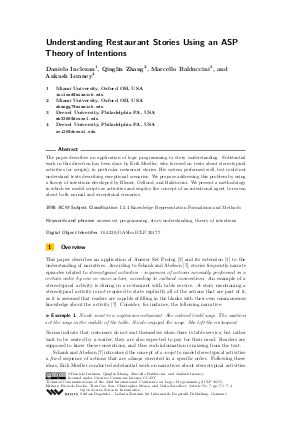Understanding Restaurant Stories Using an ASP Theory of Intentions
Authors Daniela Inclezan, Qinglin Zhang, Marcello Balduccini, Ankush Israney
-
Part of:
Volume:
Technical Communications of the 33rd International Conference on Logic Programming (ICLP 2017)
Part of: Series: Open Access Series in Informatics (OASIcs)
Part of: Conference: International Conference on Logic Programming (ICLP) - License:
 Creative Commons Attribution 3.0 Unported license
Creative Commons Attribution 3.0 Unported license
- Publication Date: 2018-02-14
File

PDF
OASIcs.ICLP.2017.7.pdf
- Filesize: 354 kB
- 4 pages
Document Identifiers
Subject Classification
Keywords
- answer set programming
- story understanding
- theory of intentions
Metrics
- Access Statistics
-
Total Accesses (updated on a weekly basis)
0PDF Downloads0Metadata Views
Abstract
The paper describes an application of logic programming to story understanding. Substantial work in this direction has been done by Erik Mueller, who focused on texts about stereotypical activities (or scripts), in particular restaurant stories. His system performed well, but could not understand texts describing exceptional scenarios. We propose addressing this problem by using a theory of intentions developed by Blount, Gelfond, and Balduccini. We present a methodology in which we model scripts as activities and employ the concept of an intentional agent to reason about both normal and exceptional scenarios.
Cite As Get BibTex
Daniela Inclezan, Qinglin Zhang, Marcello Balduccini, and Ankush Israney. Understanding Restaurant Stories Using an ASP Theory of Intentions. In Technical Communications of the 33rd International Conference on Logic Programming (ICLP 2017). Open Access Series in Informatics (OASIcs), Volume 58, pp. 7:1-7:4, Schloss Dagstuhl – Leibniz-Zentrum für Informatik (2018)
https://doi.org/10.4230/OASIcs.ICLP.2017.7
BibTex
@InProceedings{inclezan_et_al:OASIcs.ICLP.2017.7,
author = {Inclezan, Daniela and Zhang, Qinglin and Balduccini, Marcello and Israney, Ankush},
title = {{Understanding Restaurant Stories Using an ASP Theory of Intentions}},
booktitle = {Technical Communications of the 33rd International Conference on Logic Programming (ICLP 2017)},
pages = {7:1--7:4},
series = {Open Access Series in Informatics (OASIcs)},
ISBN = {978-3-95977-058-3},
ISSN = {2190-6807},
year = {2018},
volume = {58},
editor = {Rocha, Ricardo and Son, Tran Cao and Mears, Christopher and Saeedloei, Neda},
publisher = {Schloss Dagstuhl -- Leibniz-Zentrum f{\"u}r Informatik},
address = {Dagstuhl, Germany},
URL = {https://drops.dagstuhl.de/entities/document/10.4230/OASIcs.ICLP.2017.7},
URN = {urn:nbn:de:0030-drops-84638},
doi = {10.4230/OASIcs.ICLP.2017.7},
annote = {Keywords: answer set programming, story understanding, theory of intentions}
}
Author Details
References
-
Marcello Balduccini and Michael Gelfond. Logic Programs with Consistency-Restoring Rules. In Proceedings of Commonsense-03, pages 9-18. AAAI Press, 2003.

-
Justin Blount, Michael Gelfond, and Marcello Balduccini. A theory of intentions for intelligent agents. In Proceedings of LPNMR 2015, pages 134-142, 2015.

-
Michael Gelfond and Vladimir Lifschitz. Classical Negation in Logic Programs and Disjunctive Databases. New Generation Computing, 9(3/4):365-386, 1991.

-
Erik T. Mueller. Understanding script-based stories using commonsense reasoning. Cognitive Systems Research, 5(4):307-340, 2004.

-
Erik T. Mueller. Modelling space and time in narratives about restaurants. Literary and Linguistic Computing, 22(1):67-84, 2007.

-
Michaela Regneri, Alexander Koller, and Manfred Pinkal. Learning script knowledge with web experiments. In Proceedings of the ACL '10, pages 979-988, 2010.

-
R. C. Schank and R. P. Abelson. Scripts, Plans, Goals, and Understanding: An Inquiry into Human Knowledge Structures. Lawrence Erlbaum, 1977.

